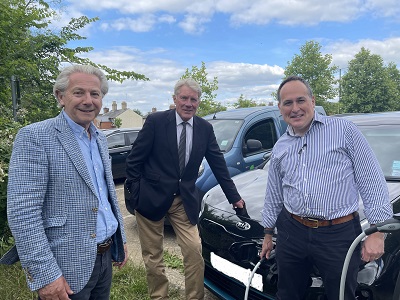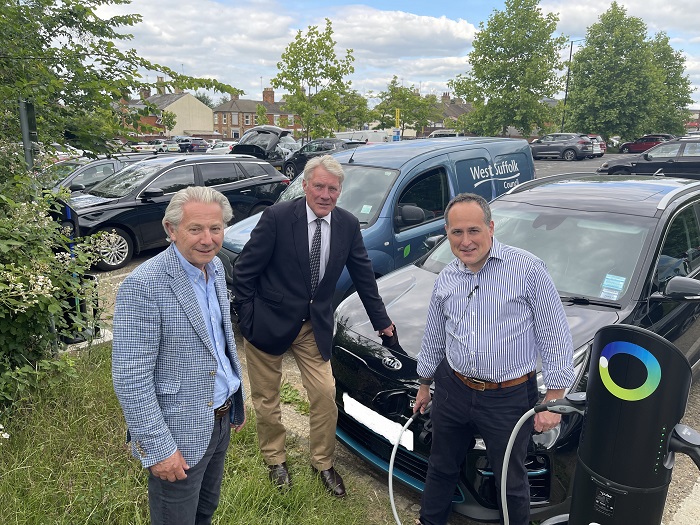Why West Suffolk is making it easier for residents to switch to electric vehicles
14 Jun 2022

For Tim Page making the decision to switch to an electric vehicle was simple: “I wanted to be able to look my kids in the eye,” he said.
He and his wife Annie are among those who have welcomed the Council’s installation of new electric vehicle chargers in Bury St Edmunds.
Electric vehicles (EVs) are better for the environment, better for people’s health, better for the economy and they are cheaper to run but owning an EV does present one significant challenge – where to recharge it.
But for residents such as Tim and Annie who live in Bury St Edmunds town centre, it has just got easier, thanks to work by West Suffolk Council.
The Council has now installed four new electric vehicle chargers serving eight parking bays in St Andrews Street car park in Bury St Edmunds. They run off renewable energy and are available to people visiting or working in the town centres as well as nearby residents who don’t have a drive but may want to switch to EV use.
Mr Page said: “As an EV owner, we know how much better they are for the environment, and we are keen to help spread the word. We bought our Kia Niro a year ago and haven’t looked back. The only downside for us has been that we have no way of charging the car at home. Tim can charge the car at his work, and most of the time that has been enough to get us to where we need to go. But there are times when it has been a bit more difficult. Having somewhere within 10 minutes’ walk of our home, where we can leave the car overnight to charge, is going to make the world of difference. It will be so much easier, and hopefully it will also give confidence to other people who have been wavering on whether to switch to an EV.”

It’s a similar story for Alistair Richards who lives close to the town centre but doesn’t have any way of recharging his plug-in hybrid at home. “I’m delighted to have more options to charge my vehicle close to where I live. This will allow me to make the most of the electric motor and reduce my use of my petrol engine. Not only will this help me to save money, but it will also play a part in helping the environment and people’s health by improving local air quality.”
While walking, cycling and public transport are more sustainable travel choices, driving an EV doesn’t produce any emissions and so helps cut air pollution which cost this country at least £16 billion in health costs each year, according to the Department for Environment, Food and Rural Affairs (DEFRA).
And EV ownership is on the rise. Government figures show EV ownership in West Suffolk is above the national average, while plug in vehicles make up more than a quarter of new vehicle sales. The Government plans to end the sale of petrol and diesel cars in the UK by 2030 with new hybrid vehicles allowed until 2035.
The new four new chargers, alongside another four being installed in Haverhill, cost a total of £90,000 and are being delivered after West Suffolk Council secured 75 per cent of the funding from the Office for Zero Emission Vehicles (OZEV) and 25 per cent from BP Chargemaster (Branded as BP Pulse). Like the Council’s other charge points, the new chargers are on the BP Pulse network. Users will need to register for a BP Pulse account to use the charging bays where they will only pay for the electricity they use.
West Suffolk Council has already either directly invested in or secured investment in EV chargers at 16 locations across West Suffolk enabling 66 EVs to be charged at any one time. These include Rapid Chargers in Bury St Edmunds, Newmarket and Mildenhall, alongside fast chargers in Brandon, Bury St Edmunds, Haverhill and Newmarket and EV lamppost chargers to support residents who don’t have driveways to switch to EVs which they can then recharge close to their home.
Leader of West Suffolk Council, Cllr John Griffiths, said: “We remain committed to further action to address the climate change emergency, to help our environment and Suffolk on its journey to becoming Net-Zero by 2030. Our work with partners to improve the local electric vehicle infrastructure is just one example of this and I am delighted to hear of the benefits that it is already bringing to our residents already using plug-in vehicles – and of course we hope it will encourage more to make the switch to EVs. We live and work in a lovely rural area but we recognise that while we can encourage people to make some of their journeys on foot, by cycling or use of public transport, the reality is that many remain dependent on the use of a car. That is why we are continuously working to invest in and secure more EV chargers across West Suffolk.”
Cllr Andy Drummond, West Suffolk Council’s Cabinet Member for Environment and Regulatory, said: “Even with the increase in electricity costs, EVs cost less per mile in fuel, are cheaper to service and to tax. More charge points are being delivered and not just by the council, and with them EVs can make many long journeys on a single charge, and they are becoming a more realistic option not just for residents but for businesses including trades people and small-scale suppliers.
“All of this is part of our wider work around reducing air pollution and helping our environment for the benefit of all who live and work here. This work includes reducing vehicle idling, encouraging greater use of clean energy particularly solar energy as well as investing to significantly cut the carbon footprint of buildings we manage across the district.”
West Suffolk Council offers a Greener Business Grant which means it will match fund a business up to £1,000 towards the cost of an electric vehicle or company charge point.
Posted in categories: press release, news, Environmental-news
